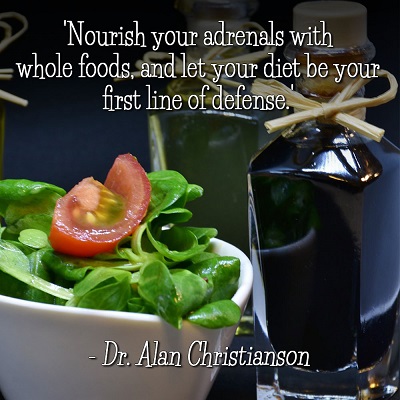 The term ‘adrenal fatigue diet’ is commonly used in alternative health circles to describe a dietary approach aimed at supporting exhausted adrenal glands. However, the mainstream medical community does not widely recognize the concept of adrenal fatigue. The symptoms attributed to it, like fatigue and hormonal imbalances, often have diverse underlying causes.
The term ‘adrenal fatigue diet’ is commonly used in alternative health circles to describe a dietary approach aimed at supporting exhausted adrenal glands. However, the mainstream medical community does not widely recognize the concept of adrenal fatigue. The symptoms attributed to it, like fatigue and hormonal imbalances, often have diverse underlying causes.
The diet typically suggests eating balanced meals, smaller servings and frequent eating, avoiding sugar and caffeine, hydrating adequately, and consuming nutrient-dense whole foods.
The Adrenal Fatigue Diet
The adrenal fatigue diet is one of the sustainable health solutions to addressing adrenal fatigue. As we all know, stress is an inevitable and natural part of life, but chronic stress conditions are a perfect recipe for awakening disease in the body, so a healthy diet is great for fighting back!
Food, exercise, and sleep form the basic pillars of health, and it makes sense that adrenal fatigue recovery will include a food-based approach to attempt to heal an overfatigued set of adrenal glands. The adrenal fatigue diet will help with your diet and nutrition choices, which becomes a critical part of any healing process.
The goal of the adrenal fatigue diet is to eat for improved energy levels. By eating the right types of food, this nutritional strategy will provide the body’s energy requirements. This will help avoid the need for the body to demand ‘artificial’ energy from adrenal hormones, to compensate for a lack of optimal nutrition.
While the adrenal fatigue diet has not been scientifically proven to overcome the damaging effects of stress, following a balanced diet and making healthier lifestyle changes remain the most effective strategies for restoring health. This especially applies to an overworked set of organs such as the adrenal glands.
Foods to Eat for Adrenal Health
Eating for better adrenal health means following a balanced diet, which includes nutrient-dense sources of macronutrients. Macronutrients are healthy fats, proteins, and carbohydrates. You should increase your intake of green leafy vegetables, colorful vegetables, and fresh fruits. You may have heard of ‘eating the rainbow’ so make sure your fruit and vegetable choices are colorful additions!
They also enhance the amount of healthy vitamins, minerals, and essential nutrients that are entering your body. All of these essential nutrients help increase your body’s energy levels and reinvigorate overworked adrenal glands. You can certainly help in your adrenal recovery if you eat more for nutrition than taste, not that healthy food shouldn’t taste good.
Here are some food suggestions to add to your grocery list:
- Lean meat or protein sources such as eggs, fish, nuts, and legumes.
- Green leafy vegetables.
- Plenty of colorful fruits and vegetables.
- Moderate salt intake.
- Healthy fat sources such as avocado and olive oil.
- Whole grains.
If you would like to follow a specific diet, the Mediterranean Diet is one you should take a look at as the Mediterranean diet is renowned for its numerous health benefits, and is considered a favorable dietary approach for supporting adrenal health. This diet places emphasis on consuming fresh fruits, vegetables, whole grains, lean proteins, and healthy fats, such as olive oil and nuts.
Rich in antioxidants, vitamins, and minerals, the Mediterranean diet can potentially aid in reducing inflammation and support overall well-being. Its focus on balanced, nutrient-dense meals can help stabilize blood sugar levels, which is crucial for maintaining consistent energy throughout the day.
Additionally, incorporating fatty fish, a staple in this diet, provides omega-3 fatty acids that could contribute to improved stress response and reduced risk of chronic diseases.
While not a direct treatment for adrenal fatigue, adopting a Mediterranean-style eating pattern can contribute positively to adrenal health due to its whole-food approach and potential to manage stress through balanced nutrition.
Foods to Avoid for Better Adrenal Health
Now you have seen the foods to eat, you can probably guess the ones to avoid! Here they are:
- Foods high in refined sugar.
- Foods high in unhealthy trans fats, such as margarine and many cooking oils.
- Caffeinated drinks such as coffee and tea.
- Processed foods containing artificial sweeteners, nitrates, and food preservatives.
- And anything else that is unhealthy!
More than eating a rigid set of foods for better adrenal health, the adrenal fatigue diet aims to make you eat more nutritious foods to help reinvigorate the body with energy. Having this energy supply will prevent the body from having to trigger a stress response just to supply the energy needed to fulfill daily tasks. This will help to break the cycle of chronic stress.
However, diet is only one important aspect to look into. You also need to find ways to address the chronically stressful environments you may be finding yourself in, and make lifestyle adjustments for long-term healing and sustainable recovery.






